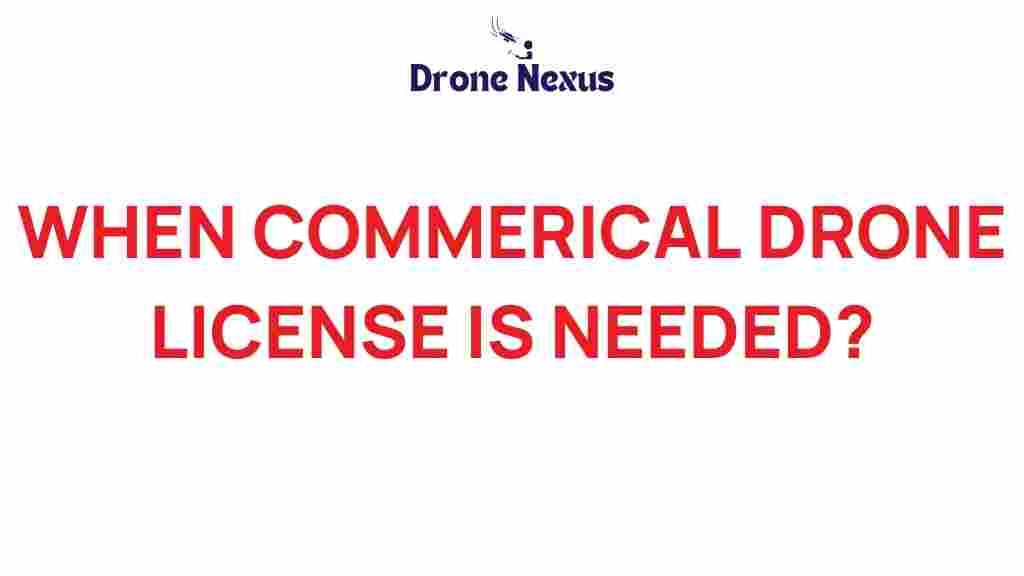Navigating the Skies: When Is a Commercial Drone License Required?
The rise of commercial drone use has transformed various industries, from real estate to agriculture. As drones become more prevalent in our daily operations, understanding the regulations surrounding them is crucial. One of the most significant aspects of this legislation is the requirement for a commercial drone license. In this article, we will explore when you need a commercial drone license, the steps to obtain one, troubleshooting tips, and much more.
What Is a Commercial Drone License?
A commercial drone license is a certification that allows individuals and organizations to operate drones for business purposes legally. In the United States, the Federal Aviation Administration (FAA) regulates this process. Obtaining a commercial drone license ensures that operators understand the safety protocols and legal requirements necessary to fly drones commercially.
When Do You Need a Commercial Drone License?
Understanding when a commercial drone license is required is essential for anyone looking to operate a drone for business. Here are some scenarios where a commercial drone license is necessary:
- Commercial Photography and Videography: If you’re using a drone to capture images or videos for a client, a commercial drone license is required.
- Aerial Surveys: Companies engaged in mapping, surveying, or inspecting land and buildings must have a commercial drone license.
- Agriculture: Drones used for crop monitoring or agricultural inspections fall under commercial use, necessitating a license.
- Real Estate: If you’re using drones to showcase properties, a commercial drone license is mandatory.
- Delivery Services: Businesses that utilize drones for delivery purposes must obtain a commercial drone license.
The FAA Regulations
The FAA has set specific guidelines regarding drone operation that require a commercial drone license. Here are some key regulations to consider:
- Part 107: This is the primary regulation governing commercial drone operations. Part 107 outlines the requirements for obtaining a license, including age, knowledge testing, and operational limitations.
- Weight Limit: Drones used for commercial purposes must weigh less than 55 pounds (including payload) to operate under Part 107.
- Visual Line of Sight: Pilots must maintain a visual line of sight with their drones at all times during operation.
Step-by-Step Process to Obtain a Commercial Drone License
Obtaining a commercial drone license involves several steps. Follow this comprehensive guide to ensure you meet all requirements:
Step 1: Verify Eligibility
Before applying, ensure you meet the following eligibility criteria:
- You must be at least 16 years old.
- You must be able to read, write, and speak English.
- You must be in a physical and mental condition that allows you to operate a drone safely.
Step 2: Study for the FAA Knowledge Test
The knowledge test covers various topics, including airspace classification, weather, and drone operations. You can find study materials online or take a prep course to increase your chances of passing.
Step 3: Schedule and Take the Test
You need to schedule your FAA knowledge test at an authorized testing center. The test consists of 60 multiple-choice questions, and you must achieve a score of at least 70% to pass.
Step 4: Complete a TSA Security Background Check
After passing the test, you must complete a Transportation Security Administration (TSA) security background check. This process can take several weeks, so plan accordingly.
Step 5: Obtain Your Remote Pilot Certificate
Once you pass the knowledge test and the TSA background check, you can apply for your Remote Pilot Certificate through the FAA. You will need to submit Form 8710-13 for this process.
Renewing Your Commercial Drone License
After obtaining your commercial drone license, it’s important to keep it current. The FAA requires you to renew your license every two years. To do this, you must:
- Complete a recurrent knowledge test.
- Ensure you meet the eligibility criteria as mentioned earlier.
Troubleshooting Common Issues
As you navigate the process of obtaining your commercial drone license, you may encounter some challenges. Here are a few common issues and their solutions:
Issue 1: Failing the Knowledge Test
If you don’t pass the FAA knowledge test, don’t be discouraged. Review the topics you struggled with and consider taking a prep course before retaking the test.
Issue 2: Delayed TSA Background Check
Background checks can take longer than expected. If you’ve waited over six weeks, contact the TSA to check the status of your application.
Issue 3: Understanding Regulations
FAA regulations can be complex. If you’re struggling to understand them, consider joining a drone pilot community or forum for support and guidance.
Benefits of Having a Commercial Drone License
There are numerous advantages to obtaining a commercial drone license. These benefits include:
- Legal Protection: Operating without a license can lead to substantial fines and legal issues.
- Business Opportunities: A commercial drone license opens the door to various business ventures, enhancing your profitability.
- Safety and Knowledge: The training you receive while obtaining your license will help you operate your drone safely and effectively.
Conclusion
In conclusion, understanding when a commercial drone license is required is crucial for anyone interested in using drones for business. By following the outlined steps to obtain your license, you can ensure compliance with FAA regulations and unlock new opportunities in various industries. Whether you’re involved in photography, agriculture, or inspections, having a commercial drone license can significantly enhance your business capabilities. For more information on drone regulations, visit the FAA’s official website.
Ready to take the next step? Join a community of drone enthusiasts and professionals to share experiences and tips on navigating the skies!
This article is in the category Safety and created by DroneNexus Team

2 thoughts on “Navigating the Skies: When Is a Commercial Drone License Required?”